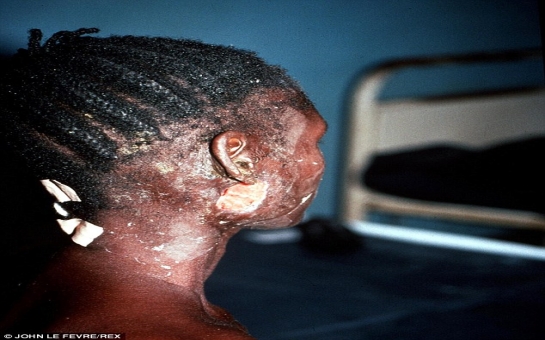It may appear as though a common cold is lurking, but unbeknownst to you the vicious Ebola virus has started to attack your immune system.The virus destroys the same cells as those targeted by HIV, though the Ebola infection is more aggressive, wiping out the building blocks of the body's immune system.It has an incubation period - that is the time from infection to when the first symptoms present themselves - of between two and 21 days, increasing the risk of the highly-infectious illness spreading.As soon as a victim starts to suffer the sudden onset of the disease, the fever, crippling headache and muscle pain, they are already contagious.The virus is transmitted through close contact with the blood, secretions, organs or other bodily fluids of infected animals.Once a human is infected, the disease can spread quickly within a community, with health workers and family members of victims at particular risk.The current outbreak rampaging through West Africa, began in a small village in Guinea and since February it has claimed 672 lives, leaving another 1,200 people infected.It has spread into neighbouring Sierra Leone and Liberia.And on Friday, U.S. citizen Patrick Sawyer died in the Nigerian capital of Lagos, having travelled there by plane after attending his sister's funeral, after she too died of the disease.This is now the most prolific Ebola outbreak since the disease was first discovered in 1976.The fact the virus mimics the symptoms of a common cold in its early stages, is the very aspect that makes the disease so difficult to diagnose.Within a few days, the early symptoms give way to the next stage of the virus.Disseminated intravascular coagulation causes clots and hemorrhaging, with clots in the liver, spleen, brain and other internal organs.The virus pierces veins and capillaries, forcing the blood vessels to bleed into the surrounding tissue.A patient will suffer aches all over the body, chronic abdominal pain, vomiting and diarrhoea.A rash then appears on the torso, quickly spreading to the limbs and head.Within a few days tipping point is reached - the moment at which some lucky patients will recover, while others will develop the fatal phase, haemorrhaging fever.The body's immune system turns on itself. Tiny blood vessels burst, causing patients to spontaneously bleed from their eyes, mouths, ears, and other orifices.Internally bleeding is likely in the gastrointestinal tract and other internal organs.The whites of a patient's eyes will turn red and blood spots appear in vomit and diarrhoea, as large blood blisters develop under the skin.For those who succumb to the disease, death is usually the result of multiple organ failure, haemorrhaging or shock and typically occurs between eight and 17 days after a person first falls ill.For those who survive, they must be regularly tested, to ensure the virus is no longer present within their bodily fluids, before it is safe to be discharged from hospital.The virus can also be sexually transmitted for up to 40 days after a man has recovered.There is currently no vaccine to protect against the Ebola virus. And in the absence of a specific treatment plan or drug to tackle the disease, it poses a real risk.(dailymail.co.uk)Bakudaily.az
What happens when you are infected with the Ebola virus? - PHOTO
World
10:15 | 31.07.2014

What happens when you are infected with the Ebola virus? - PHOTO
You have a temperature and no appetite. Your head is aching and you're throat is sore.
Follow us !










